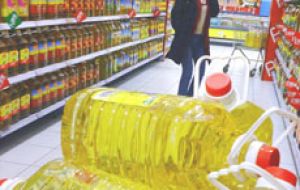MercoPress. South Atlantic News Agency
Cooling inflation, China's central bank main task for 2008

China's central bank said it will take more steps this year to cool inflation and prevent the world's fastest growing major economy from overheating. A “tighter monetary policy” will “help prevent the economy from overheating and prevent price increases from spreading”, the central bank said in a statement last week after concluding a two-day annual work meeting in Beijing.
Top government leaders agreed the two key risks facing the economy in 2008 are overheating and inflation, which in 2007 grew at the fastest pace in eleven years. The People's Bank of China last year raised its benchmark one-year lending rate to a nine-year high and the amount banks must set aside as reserves to the most since at least 1998. The central bank is trying to grapple with money flooding the economy from a record trade surplus. China's foreign exchange reserves, the world's biggest swelled to 1.46 trillion US dollars at the end of October. House prices in 70 major Chinese cities jumped 10.5% in November from a year earlier. Inflation, 4.7% in 2007 also became the main concern (35%) of Chinese citizens followed by the growing social gap and corruption according a public opinion poll from the Social Sciences Academy reported by the official Xinhua news agency. During the last decade the main concerns of the Chinese people had been the precarious social services and redundancies forced by the quick transformation of the Chinese economy. The official inflation target for 2007 was 3%, and most of the inflationary increase (80%) is attributed to soaring food prices. The People's Bank of China statement omitted any specific policy plans for the Yuan, apart from a line that the central bank will "deepen the foreign-exchange management system and steadily push ahead" with plans to gradually allow the Yuan to be convertible into other currencies for investment, not just trade. Su Ning, a central vice governor was quoted saying that the bank will increase the flexibility of the exchange rate in 2008 to allow it to play a bigger role in cooling inflation and easing trade imbalances, according to 21st Century Business Herald, a Guangzhou-based newspaper. A stronger currency would help cool inflation by lowering import costs and slowing the inflow of money from exports. China's trade surplus surged 52% in the 11 months through November to 238.1 billion US dollars.




Top Comments
Disclaimer & comment rulesCommenting for this story is now closed.
If you have a Facebook account, become a fan and comment on our Facebook Page!